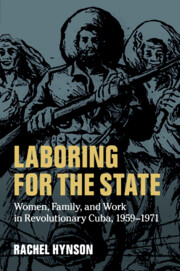Book contents
- Laboring for the State
- Cambridge Latin American Studies
- Laboring for the State
- Copyright page
- Dedication
- Contents
- Figures
- Acknowledgments
- Abbreviations
- Introduction
- 1 In the Hands of Physicians
- 2 “The husband must protect the wife and the latter obey the husband”
- 3 From the Streets to the Home
- 4 The Elasticity of Truth
- Epilogue
- Bibliography
- Index
- Series page
Introduction
Socialist Morality, the Nuclear Family, and State Labor
Published online by Cambridge University Press: 09 January 2020
- Laboring for the State
- Cambridge Latin American Studies
- Laboring for the State
- Copyright page
- Dedication
- Contents
- Figures
- Acknowledgments
- Abbreviations
- Introduction
- 1 In the Hands of Physicians
- 2 “The husband must protect the wife and the latter obey the husband”
- 3 From the Streets to the Home
- 4 The Elasticity of Truth
- Epilogue
- Bibliography
- Index
- Series page
Summary
The Introduction outlines revolutionary leadership’s liberal view – pervasive at the time but little recognized by scholars to date – that all Cubans should be absorbed into a nuclear family, for their own good and to advance the goals of the Revolution. In order to telegraph this redefinition of morality – and its consolidation around the nuclear family – leadership and the state media sought to mobilize and modify the meaning of words related to family and identity. Using feminist gender analysis, discourse analysis, and the Gramscian concept of hegemony, the Introduction highlights how ordinary Cubans responded by constructing alternatives to the narrative espoused by the state. This analysis of how power was consolidated throughout the first decade traces two intersecting developments: the state’s steady progression from a democratic to authoritarian movement and its increasing attempts to monopolize morality, albeit with some resistance from ordinary Cubans that has heretofore been obscured from the grand narrative of Revolution. Indeed, a focus on the inconvenient truths of the government’s own past reveals how utterly the Revolution failed to impose a normative definition of morality and how reluctant citizens were to comply with state models of morality.
Keywords
- Type
- Chapter
- Information
- Laboring for the StateWomen, Family, and Work in Revolutionary Cuba, 1959–1971, pp. 1 - 38Publisher: Cambridge University PressPrint publication year: 2020

